

T. Boone Pickens. Thomas Boone Pickens (born May 22, 1928), known as T.
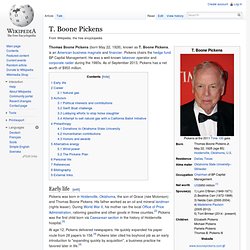
Boone Pickens, is an American business magnate and financier. Pickens chairs the hedge fund BP Capital Management. He was a well-known takeover operator and corporate raider during the 1980s. As of September 2013, Pickens has a net worth of $950 million. Early life[edit] At age 12, Pickens delivered newspapers. Dragoon. The word dragoon originally meant mounted infantry, who were trained in horse riding as well as infantry fighting skills.
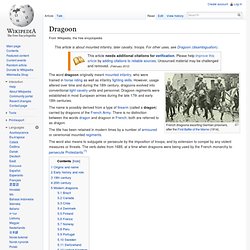
However, usage altered over time and during the 18th century, dragoons evolved into conventional light cavalry units and personnel. Dragoon regiments were established in most European armies during the late 17th and early 18th centuries. Mounted infantry. Mounted infantry were infantry who rode horses instead of marching, but, as infantry does in general, fought on foot (in the modern era with muskets or rifles, but before that with swords, spears, bows, or crossbows).
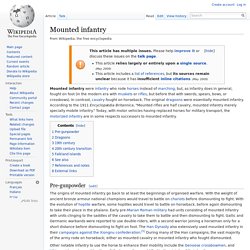
In contrast, cavalry fought on horseback. The original dragoons were essentially mounted infantry. According to the 1911 Encyclopædia Britannica, "Mounted rifles are half cavalry, mounted infantry merely specially mobile infantry. " Today, with motor vehicles having replaced horses for military transport, the motorized infantry are in some respects successors to mounted infantry. Scroll lock. The scroll-lock key with activated indicator light on an IBM keyboard.
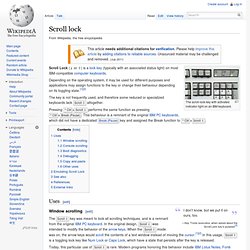
Depending on the operating system, it may be used for different purposes and applications may assign functions to the key or change their behaviour depending on its toggling state.[1][2] The key is not frequently used, and therefore some reduced or specialized keyboards lack Scroll ⇩ altogether. Pressing ^ Ctrl+Scroll ⇩ performs the same function as pressing ^ Ctrl+Break (Pause). List of Book of the Dead spells. Tim Berners-Lee. Sir Timothy John "Tim" Berners-Lee, OM, KBE, FRS, FREng, FRSA, DFBCS (born 8 June 1955),[1] also known as TimBL, is an English computer scientist, best known as the inventor of the World Wide Web.
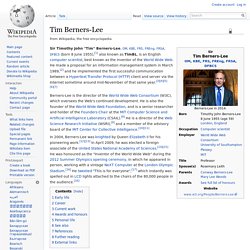
He made a proposal for an information management system in March 1989,[2] and he implemented the first successful communication between a Hypertext Transfer Protocol (HTTP) client and server via the Internet sometime around mid-November of that same year.[3][4][5][6][7] Berners-Lee is the director of the World Wide Web Consortium (W3C), which oversees the Web's continued development. He is also the founder of the World Wide Web Foundation, and is a senior researcher and holder of the Founders Chair at the MIT Computer Science and Artificial Intelligence Laboratory (CSAIL).[8] He is a director of the Web Science Research Initiative (WSRI),[9] and a member of the advisory board of the MIT Center for Collective Intelligence.[10][11] Early life Career Current work Awards and honours Personal life.
Semantic Web. The Semantic Web is a collaborative movement led by international standards body the World Wide Web Consortium (W3C).[1] The standard promotes common data formats on the World Wide Web.

By encouraging the inclusion of semantic content in web pages, the Semantic Web aims at converting the current web, dominated by unstructured and semi-structured documents into a "web of data". The Semantic Web stack builds on the W3C's Resource Description Framework (RDF).[2] According to the W3C, "The Semantic Web provides a common framework that allows data to be shared and reused across application, enterprise, and community boundaries".[2] The term was coined by Tim Berners-Lee for a web of data that can be processed by machines.[3] While its critics have questioned its feasibility, proponents argue that applications in industry, biology and human sciences research have already proven the validity of the original concept. History[edit] Arsène Lupin III. He is acknowledged by virtually every law agency on Earth as the world's number one thief.
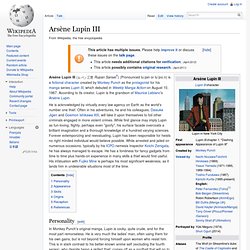
Often in his adventures, he and his colleagues, Daisuke Jigen and Goemon Ishikawa XIII, will take it upon themselves to foil other criminals engaged in more violent crimes. While first glance may imply Lupin as fun-loving, flighty, perhaps even "goofy", his surface facade overcoats a brilliant imagination and a thorough knowledge of a hundred varying sciences. Forever extemporizing and reevaluating, Lupin has been responsible for heists no right minded individual would believe possible. While arrested and jailed on numerous occasions, typically by his ICPO nemesis Inspector Koichi Zenigata, he has always managed to escape. He has a fondness for fancy gadgets from time to time plus hands-on experience in many skills a thief would find useful. Microsoft Entertainment Pack. The original Windows Entertainment Pack (WEP) is a collection of simply-designed 16-bit computer games for Windows.
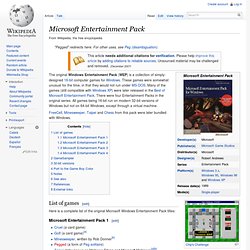
These games were somewhat unusual for the time, in that they would not run under MS-DOS. Many of the games (still compatible with Windows XP) were later released in the Best of Microsoft Entertainment Pack. There were four Entertainment Packs in the original series. All games being 16-bit run on modern 32-bit versions of Windows but not on 64-bit Windows, except through a virtual machine. East Germany jokes. Examples[edit] Economic scarcity[edit] What would happen if the desert became a socialist country?
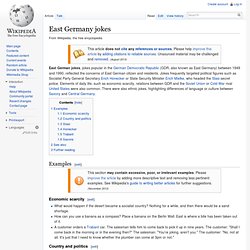
Nothing for a while, and then there would be a sand shortage.How can you use a banana as a compass? Chip's Challenge. Chip's Challenge is a top-down tile-based puzzle video game created in 1989 by Chuck Sommerville originally for the hand-held Atari Lynx.
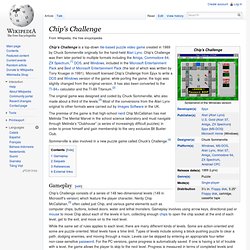
Chip's Challenge was then later ported to multiple formats including the Amiga, Commodore 64, ZX Spectrum,[1] DOS, and Windows, included in the Microsoft Entertainment Pack and Best of Microsoft Entertainment Pack (the last of which was written by Tony Krueger in 1991). Microsoft licensed Chip's Challenge from Epyx to write a DOS and Windows version of the game; while porting the game, the logic was slightly changed from the original version. It has also been converted to the TI-84+ calculator and the TI-89 Titanium.[2] The original game was designed and coded by Chuck Sommerville, who also made about a third of the levels.[3] Most of the conversions from the Atari Lynx original to other formats were carried out by Images Software in the UK.
Sommerville is also involved in a new puzzle game called Chuck's Challenge.[4] Daemon (computing) Systems often start daemons at boot time and serve the function of responding to network requests, hardware activity, or other programs by performing some task. Daemons can also configure hardware (like udevd on some GNU/Linux systems), run scheduled tasks (like cron), and perform a variety of other tasks.
The word daemon is an alternative spelling of demon,[3] and is pronounced /ˈdiːmən/ DEE-mən. In the context of computer software, the original pronunciation /ˈdiːmən/ has drifted to /ˈdeɪmən/ DAY-mən for some speakers.[1] Alternate terms for daemon are service (Microsoft Windows NT), started task (IBM z/OS),[4] and ghost job (XDS UTS). In a strictly technical sense, a Unix-like system process is a daemon when its parent process terminates and the daemon is assigned the init process (process number 1) as its parent process and has no controlling terminal.
Tidewater accent. The Tidewater accent, also known as Tidewater English, Tidewater Dialect or the Chesapeake Accent, is a specific dialect of Southern American English. While the dialect is said to have roots up and down the eastern seaboard, it is primarily concentrated in the southeastern part of Virginia, otherwise known as the Tidewater Region. This region consists of the Hampton Roads, parts of the Outer Banks of North Carolina, and parts of the eastern shore of Virginia, Maryland, and Southern Delaware and also on the Western shore in remote peninsular areas of Southern Maryland in St. Mary's County, Maryland [1] and Calvert County, Maryland.[2] History[edit] This dialect of American English has evolved over a period of four hundred years from the English that was spoken by those who initially settled the area. Chesapeake Bay islands[edit] Great Vowel Shift. Madonna–whore complex. In sexual politics the view of women as either Madonnas or whores limits women's sexual expression, offering two mutually exclusive ways to construct a sexual identity.[4] The term is also used popularly, often with subtly different meanings.
Causes[edit] Freud argued that the Madonna–whore complex is caused by oedipal castration fears which arise when a man experiences the affection he once felt for his mother with women he now sexually desires. In order to manage this anxiety, the man categorizes women into two groups: women he can admire and women he finds sexually attractive. Invasion of Poland. Usury. Usury (/ˈjuːʒəri/[1][2]) is the practice of making unethical or immoral monetary loans intended to unfairly enrich the lender. A loan may be considered usurious because of excessive or abusive interest rates or other factors, but according to some dictionaries, simply charging any interest at all can be considered usury.[3][4][5] Someone who charges usury can be called an usurer, but the more common term in English is loan shark.
The term may be used in a moral sense—condemning taking advantage of others' misfortunes—or in a legal sense where interest rates may be regulated by law. Historically, some cultures (e.g., Christianity in much of Medieval Europe, and Islam in many parts of the world today) have regarded charging any interest for loans as sinful.